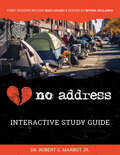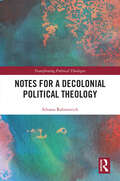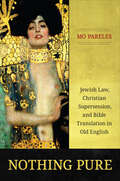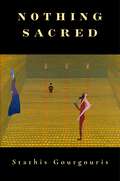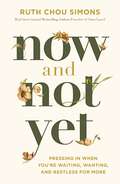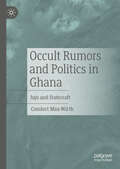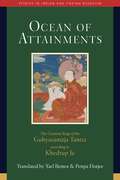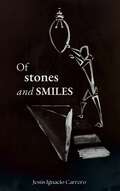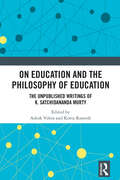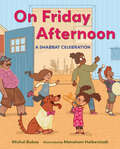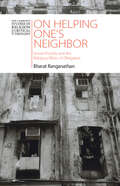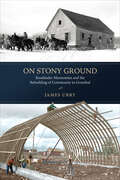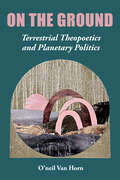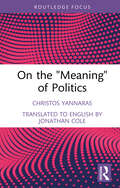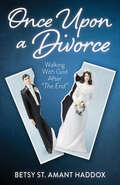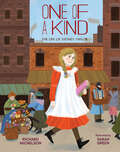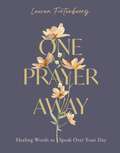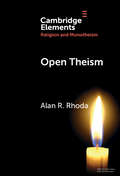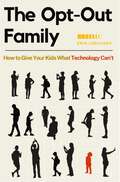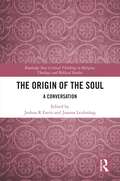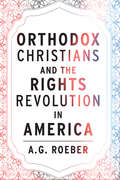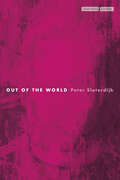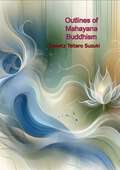- Table View
- List View
No Address: An Interactive Study Guide
by Dr. Robert G. Marbut Jr.A four-session interactive Bible study, based on the documentary Americans with No Address, that examines the biblical response to people experiencing homelessness. Homelessness is not an &“issue&”; it&’s an opportunity for the church to love our neighbors. In this four-session interactive Bible study, we examine what Scripture has to say on the topic. A companion to the documentary Americans with No Address and the full-length theatrical movie No Address (starring Ashanti, William Baldwin, Beverly D&’Angelo, and Xander Berkeley), this study teaches participants: The root causes of different types of homelessness. How to engage rather than enable. The importance of collaboration among existing agencies. How to mobilize their church to follow Jesus&’ call to serve. Each session includes: Facts, true stories, and background about the people who experience homelessness in America. QR code for quick link to online videos. Discussion questions for churches and small groups. Perspective from the Bible. &“Go and Do&” action steps. Ideas for further resources. Prayer prompts and reflection questions. The government can&’t solve homelessness alone. The nonprofit sector can&’t solve it alone. But neighbors loving neighbors, working together, can make a difference for the people who are experiencing homelessness in America. No Address equips Christians to lead the way.
Notes for a Decolonial Political Theology (Transforming Political Theologies)
by Silvana RabinovichAt the crossroads of ethics, poetics and politics, this innovative book outlines a series of notes to decolonize political theology. The author proposes counter-hegemonic forms of reading, which deconstruct domination by embracing fragility. The book opens with a diapason of prejudicelessness as a decolonial key, focusing on prejudices that hinder critical attention to a colonial political theology that perpetuates hatred. The first set of notes aims to ‘de-orientalize the Semite’ by reading midrashic and biblical texts in the present context, the second seeks to decolonize language by exploring the power of translation, and the third ponders decolonial theo-logics to outline a justice of the other. Connecting a number of fields, authors, and epistemologies, the book addresses the Israeli-Palestinian conflict and brings together Jewish thought, continental philosophy, and Latin American perspectives. It engages with a range of thinkers, including Benjamin and Arendt, and features an interview with Enrique Dussel. This is an important methodological proposal for interdisciplinary and intercultural political theology and a valuable contribution towards rethinking the paradigm of political theology beyond its Eurocentric and colonialist premises.
Notes for a Decolonial Political Theology (Transforming Political Theologies)
by Silvana RabinovichAt the crossroads of ethics, poetics and politics, this innovative book outlines a series of notes to decolonize political theology. The author proposes counter-hegemonic forms of reading, which deconstruct domination by embracing fragility. The book opens with a diapason of prejudicelessness as a decolonial key, focusing on prejudices that hinder critical attention to a colonial political theology that perpetuates hatred. The first set of notes aims to ‘de-orientalize the Semite’ by reading midrashic and biblical texts in the present context, the second seeks to decolonize language by exploring the power of translation, and the third ponders decolonial theo-logics to outline a justice of the other. Connecting a number of fields, authors, and epistemologies, the book addresses the Israeli-Palestinian conflict and brings together Jewish thought, continental philosophy, and Latin American perspectives. It engages with a range of thinkers, including Benjamin and Arendt, and features an interview with Enrique Dussel as well as a foreword by Gil Anidjar. This is an important methodological proposal for interdisciplinary and intercultural political theology and a valuable contribution towards rethinking the paradigm of political theology beyond its Eurocentric and colonialist premises.
Nothing Pure: Jewish Law, Christian Supersession, and Bible Translation in Old English
by Mo ParelesEarly English culture depended on a Judaism translated away from Jews. Revealing the importance of Jewish law to the workings of early Christian England, Nothing Pure presents a Jewish revision of the history of English Bible translation. The book illuminates the paradoxical process by which the abjection and dehumanization of Jews, a bitter milestone in the history of European racism, was first articulated in the cultural translation of Jewish literature. It locates Old English Bible translation within the history of cultural translation, so that instead of appearing as the romantically liberated fragments of a suppressed mode of literacy, these authorized and semi-authorized vernacular works can be seen as privileged texts appropriating a Jewish source culture into an English Christian host culture. Mo Pareles proposes a theory of translation called supersessionary translation to explain the aesthetics of these texts: while at first glance they appear to dismiss irrelevant Jewish laws according to an arbitrary pattern, closer analysis reveals that they are masterful attempts to subject the legacy of Judaism, through translation, to the control of a system that has purportedly superseded and replaced it. Ultimately, Nothing Pure demonstrates the surprisingly central role of Jewish law in translation to Christian identity in late Old English ecclesiastical and monastic writings.
Nothing Sacred
by Stathis GourgourisNothing Sacred makes a bold call for reconceptualizing the projects of humanism and democracy as creative sources of emancipatory meaning, from the immediate political sphere to the farthest reaches of planetary ways of living.Restaging Aristotle’s classic notion of the “political animal” in broad historical and geographical frames, Stathis Gourgouris explores the autopoietic capacities of human-being in society, while developing new frameworks of anticolonial humanism and radical democracy as the only worthy adversaries of neoliberal capitalism.This reconfigured anthropological horizon enables us to imagine new ways of living by learning to pursue a radical politics of autonomy and a planetary vision that upholds life-affirming coexistence and equal sharing against the fetishism of hierarchy and servitude, money and technologic, sovereignty and endless growth.Written with daring, erudition, and anarchic contestation, this book seeks the political through a poetic perspective. Nothing Sacred rejects niche thinking in the academy and engages a vast domain of reflections on the problem of human-being in today’s dismal world.
Now and Not Yet: Pressing in When You’re Waiting, Wanting, and Restless for More
by Ruth Chou SimonsBestselling author Ruth Chou Simons guides readers who are restless in their current circumstances on a journey of growth, purpose, and pressing in.Too often, we feel disappointed with our "right now"--our life circumstances, our relationships, our progress, our daily grind. We want to do so many things--good, godly things--but our situations don't allow us to step into them. Are we missing out on our own lives? Why does right now seem so far from where we really long to be?Bestselling author Ruth Chou Simons reminds us that it's okay to not like the right now we've been given, but we don't have to like it to lean in. In Now and Not Yet, Ruth shows us how to.. .embrace the biblical truth that someday is made up of thousands of right nows;discern how the difficult parts of our lives are actually a unique gift by discovering five ways to flip the script on a hard season;stop feeling trapped when we are not where we want to be with guided liturgies for what we are facing today; andlive faithfully in the tension between what is and what is not yet. Your right now matters. And you can choose to press in and not check out. To know God is at work even when you don't see the progress you're looking for. To start where you are in this very moment. Because he's not through with you yet.
Occult Rumors and Politics in Ghana: Juju and Statecraft
by Comfort Max-WirthThis book addresses the phenomenon of rumors about the occult in contemporary Ghanaian politics. Drawing on data from fieldwork interviews and analysis of case studies, it examines: why political rumors in Ghana often focus on the occult; what political-occult rumors accomplish and for whom; the ways in which Ghanaian politicians use rumors about the occult to gain political advantage; and some of the popular attitudes of the electorate to the rumors. The book demonstrates that political-occult rumors have become important tools in the hands of Ghanaian politicians to gain political advantage over opponents, and the electorate as means to critique the actions and behavior of political actors and the political process, generally. In a nutshell, this book highlights the important role of occult rumors in modern Ghanaian politics, with a particular focus on the period between the late 1970s and present. The main thrust of the argument in this book is that the flourishing of political-occult rumors and the strength of Pentecostalism are related, and that far from being a phenomenon existing on the margins of modern Ghanaian society, the occult is powerful, public and mainstream.
Ocean of Attainments: The Creation Stage of Guhyasamaja Tantra According to Khedrup Jé
by Yael Bentor and Penpa DorjeeThis commentary on Guhyasamaja tantra is the seminal guide to deity yoga and tantric visualization for the Geluk school of Tibetan Buddhism.Ocean of Attainments was composed by Khedrup Jé Gelek Palsang (1385–1438), one of Tsongkhapa Losang Drakpa&’s most prominent disciples. Its subject is the creation stage, a quintessential Buddhist tantric meditation that together with the completion stage comprises the path of unexcelled tantra. The Guhyasamaja Tantra, referred to as the &“king of all tantras,&” is revered in Tibet, especially by the Geluk school, for its hermeneutic methods, which are in turn applied to other tantras. In the creation stage, meditators visualize themselves as buddhas at the center of the celestial mandala, surrounded in all directions by male and female bodhisattvas and enlightened beings. Since the core of the practice is visualization, this meditation—perhaps more than other meditations—presumes the creative power of the mind. Visualizations form the basis not only of the creation stage and deity yoga but of all tantric practices and rituals, since tantric practice takes place not in mundane existence but in the illusion-like purity of the enlightened view. While the previously published Essence of the Ocean of Attainments is a concise exposition on the practice of the Guhyasamaja sadhana, Ocean of Attainments is much more detailed, providing extensive scriptural citations, clear explanation of the body mandala, arguments on points of contention, reference to other tantric systems, and critiques of misinterpretations. Complemented by the extensive and clear introduction, this volume is a vital contribution to the growing body of scholarship on Guhyasamaja and on Buddhist tantra in general.
Ocean of No Escape (Goldtown Adventures #6)
by Susan K. MarlowIs escape even possible when you've been shanghaied? Jem Coulter, his family, and Strike-It-Rich Sam journey to San Francisco with the newfound gold to see if surgery can fix Nathan's broken legs. The uncertainty of Nathan's recovery leaves Jem bored and worried, so he heads to the waterfront to explore. The merchant ships look exciting--where could they be sailing? A sailor's invitation turns into an unexpected kidnapping that forces Jem into the life of a cabin boy. Forced to eat awful food and filled with a fear he'll never see his family again, Jem wonders if he can escape by jumping ship. Join Jem on the deck as he navigates the rough seas.
Of Stones and Smiles
by Jesús Ignacio CarreroWritten in poetic prose, although it features poems with different themes, in this first poem collection, the author shows us, from different perspectives, how our life is full of stones that do not exist, but we insist on seeing and of smiles that we do not see, but that are there whenever we want to access them. Must we only open our eyes? You will find out inside the book. Besides, among stones and smiles, the author also takes us through situations where two are always one, because in love, one cannot be two. In this way, he makes us aware of the intangible, the only thing that can lead us to plenitude. It’s because of this that we are can walk through worlds that are made from some verses that can only be written by the soul. In fact, that’s how it has been. And if by the inertia of what you are doing, as you turn the final page, you and what you used to be were no longer here?
On Education and the Philosophy of Education: The Unpublished Writings of K. Satchidananda Murty
by Ashok Vohra Kotta RameshThis volume is a collection of K. Satchidananda Murty's unpublished writings. It presents Murty's views on the theory and praxis of education. Murty advocates for free universal education and presents a charter for education in the 21st Century which promotes higher studies in mathematics, science, and technology. He provides a comparative analysis of Western and Asian curriculums and explores the possibilities of introducing more courses on Eastern philosophy. The essays also tackle the teacher-student relationship, moral education, and discipline in the classroom. An important contribution, the book presents K. Satchidananda Murty's contribution to philosophy during sixty-one years of his engagement with active writing and teaching. It will be of great interest to scholars, teachers, and students of education, Indian philosophy, Asian Philosophy, comparative philosophy, religious studies, and South Asian studies.
On Friday Afternoon: A Shabbat Celebration
by Michal BabayFriday afternoon turns into a rambunctious adventure, filled with mitzvot and mayhem, as Leelee and Pickles help their family prepare for Shabbat.There's only three hours until Shabbat, and there's still a lot to be done! But Friday afternoon's plans of cleaning the house and collecting donations go sideways with Leelee and her dog, Pickles, at the helm. With so much to do - and so many distractions - will the family be ready in time for candle lighting?A rhythmic, silly, and heartwarming glimpse inside a Jewish home as they prepare for Shabbat.
On Helping One's Neighbor: Severe Poverty and the Religious Ethics of Obligation (New Cambridge Studies in Religion and Critical Thought)
by null Bharat RanganathanExploring what he calls 'the moral horror that is severe poverty,' Bharat Ranganathan develops a demanding account of the obligations that affluent people have to assist severely impoverished people. He argues that this is an immediate ethical as much as a social or structural imperative. Noting that developmental economists and moral and political philosophers have focused on wealth inequalities in increasingly sophisticated ways, Ranganathan observes that – within religious ethics – normative issues around severe poverty have nevertheless received insufficient attention. Bringing together general moral, religious, and philosophical principles with particular economic, social, and political realities, and engaging constructively with the writings of John Rawls and Peter Singer, this passionately argued book boldly challenges deleterious trends within ethics by unpacking, in a much more systematic way than hitherto, the pressing dilemmas around acute impoverishment. It will find an eager readership among scholars of religion, ethics, developmental studies, and theology.
On Stony Ground: Russländer Mennonites and the Rebuilding of Community in Grunthal (Transnational Mennonite Studies #2)
by James UrryOn Stony Ground presents a historical ethnographic account of a generation of Mennonites from the Soviet Union who, following Russia’s revolution and civil war, immigrated to Manitoba during the 1920s. James Urry examines how they came to terms with a new land and with their new neighbours, including other Mennonites, Ukrainians, French Canadians, and Indigenous Peoples. The book discusses the impact of the Great Depression and how the immigrants struggled with their identity in Canada as Hitler and Stalin rose to power in Germany and the USSR. It reveals the immigrants’ desire to maintain their faith, language, and culture while encouraging their children to take advantage of an education conducted mainly in English. On Stony Ground explores how prosperity following the Second World War helped the immigrants to build a community in conjunction with others, including Mennonites and non-Mennonites, and to accept their new home in Canada.
On the Ground: Terrestrial Theopoetics and Planetary Politics
by O'neil Van HornA bold, theoretical, and pragmatic book that looks to soil as a symbol for constructive possibilities for hope and planetary political action in the Anthropocene.Climate change is here. Its ravaging effects will upend our interconnected ecosystems, and yet those effects will play out disproportionately among the planet’s nearly 8 billion human inhabitants. On the Ground explores how one might account for the many paradoxical tensions posed by the Anthropocene: tensions between planetarity and particularity, connectivity and contextuality, entanglement and exclusion. Using the philosophical and theological idea of “ground,” Van Horn argues that ground—when read as earth-ground, as soil—offers a symbol for conceiving of the effects of climate change as collective and yet located, as communal and yet differential. In so doing, he offers critical interventions on theorizations of hope and political action amid the crises of climate change.Drawing on soil science, theopoetics, feminist ethics, poststructuralism, process philosophy, and more, On the Ground asks: In the face of global climate catastrophe, how might one theorize this calamitous experience as shared and yet particular, as interconnected and yet contextual? Might there be a way to conceptualize our interconnected experiences without erasing critical constitutive differences, particularly of social and ecological location? How might these conceptual interventions catalyze pluralistic, anti-racist planetary politics amid the Anthropocene? In short, the book addresses these queries: What philosophical and theological concepts can soil create? How might soil inspire and help re-imagine forms of planetary politics in the midst of climate change? On the Ground thus roots us in a robust theoretical symbol in the hopes of producing and proliferating intersectional responses to climate change.
On the 'Meaning' of Politics (Transforming Political Theologies)
by Christos YannarasThis book offers a concise, yet provocative, summation of Christos Yannaras’ long reflection on the meaning of politics. It provides vital clarification on Yannaras’ conception and understanding of politics and his interpretation of its historical development in the Western and Eastern theological/civilisational traditions. The book critiques the Western (Christian) tradition of political thought and praxis, namely its individualistic epistemology, its utilitarian political organisation, its obsession with rationalistic efficiency, and its religionized Christianity with all the destructive ideologies flowing therefrom. It aims to recover and counterpose a Greco-Christian conception and practice of politics based on communion, the ecclesia, truth as a collective and common contest or struggle to discover, reveal and manifest cosmic reality and an ontological vision of humans living in harmony with the ornamental order of the universe. With a foreword by Rowan Williams, this is a highly original and significant meditation on the meaning of politics that will be of interest to both political theologians and political philosophers.
Once Upon a Divorce: Walking With God After "The End"
by Betsy St. Amant HaddoxWhat happens when the author of happily-ever-after romances gets divorced? As a divorce survivor and single mom, Betsy St. Amant Haddox--known for her charming rom-coms--shares her own raw, unfiltered story of what happens after the fairy tale ends. Complete with plenty of what-not-to-do tales, Once Upon a Divorce features what she learned on her bumbling journey to wholeness. In her humorous, vulnerable, and authentic way, Betsy recounts how she navigated her ex-husband's abandonment and the seeming silence from heaven that followed. She takes readers through the thorny path of figuring out life as a single mother, healing from loss, and finding God to be faithful through it all. Once Upon a Divorce proves that the end of a marriage isn't the end of the story. Christian women will embrace this book because it helps them feel seen and validated amid their own relationship storms. And they will appreciate the biblical perspective Betsy brings as she tackles divorce and its aftermath from a Christian perspective, not a "girl power" one. Join Betsy as she shares heartfelt advice for the "now what?" chapter--advice learned firsthand on acceptance, forgiveness, and the hard-won truth of hoping for more, while being content right where you are.
One of a Kind: The Life of Sydney Taylor
by Richard MichelsonFor fans of All-of-a-Kind Family, here is the true story of how Sarah Brenner, a poor girl from New York City&’s Lower East Side, became Sydney Taylor: dancer, actress, and successful children&’s book author.Sarah Brenner might have come from an all-of-a-kind family (five sisters who all dressed alike), but she was always one of a kind. Growing up in a Jewish immigrant family on New York&’s impoverished Lower East Side, Sarah loved visiting the library, celebrating holidays with her family, and taking free dance classes at the Henry Street Settlement. But she was always aware of things that weren&’t fair—whether it was that women couldn&’t vote, or how girls were treated in her school, or that her parents had had to leave Europe because they were Jewish. When she grew up, Sarah changed her name to Sydney and became an actress and a dancer, but she never forgot the importance of fighting unfairness, whether it was anti-Semitism at her job or the low wages of workers. And when her daughter complained that it wasn&’t fair that there were no books about Jewish children like her, Sydney put pen to paper and wrote a one-of-a-kind children&’s book.From well-known Jewish children&’s author Richard Michelson, this is the story of how Sarah became Sydney and how she showed children the joy of seeing their culture reflected on the page.
One Prayer Away: Healing Words to Speak Over Your Day (90 Devotions for Women)
by Lauren FortenberryFind hope when you need it the most with this gorgeous 90-day devotional for women who need a reminder that God can bring you past your broken beginnings, through the messy middles, and into a faith-filled future.When you're at the edge of what your heart can handle. When you can't see the road ahead. When you wonder if the hurt is beyond healing. One Prayer Away by Lauren Fortenberry is for every moment of the journey.Each day invites you to begin with your brokenness. To speak to God about what keeps you up at night. To know that in every single thing you carry today, you do not need to carry it alone. One Prayer Away includes:90 meditations of hope and encouragement in Lauren's signature poetic stylePrayers to receive for yourself or to pray for othersBible verses relevant to each day's needs like hope, mercy, and surrenderInspirational quotes and soothing photography to create a place where your soul can rest This beautiful devotional is a thoughtful gift for:A friend who needs encouragement in times of uncertainty, anxiety, loneliness, and lossWomen's prayer groups or Bible studiesMother&’s Day, birthdays, or simply to say "I'm thinking of you"Any woman who desires to grow spiritually Whether you are struggling or seeking, flying or failing—God is with you. You can trust Him to hold you through it all.
Open Theism (Elements in Religion and Monotheism)
by null Alan R. RhodaThis Element shows Open theism as a monotheist model of God according to which the future is objectively open-ended, not just from the finite perspective of creation, but from God's perspective as well. This Element has three main sections. The first carefully defines open theism, distinguishes its major variants, compares it to other monotheistic models, and summarizes its history. The second develops biblical and philosophical arguments for open theism against its main rivals, emphasizing a novel philosophical argument that a causally open future must also be ontically, alethically, epistemically, and providentially open as well. The third responds to common objections against open theism related to perfect being theology, the ethics of risk-taking, biblical prophecy, and theological tradition.
The Opt-Out Family: How to Give Your Kids What Technology Can't
by Erin LoechnerDiscover a new and hopeful path forward as you consider your family's approach to social media, screen time, and technology.We've all heard the mind-boggling statistics about technology and social media use. The numbers don't lie; our obsession with smartphones and social media is slowly eroding the very essence of our homes and families. We see it. We feel it. We know it.So what do we do about it?Spoiler alert: Forget parental control apps, time limits, or reward charts. This revolutionary path takes us into the heart of the beast itself: the social media algorithm. Former social media influencer and trailblazer Erin Loechner has seen the perks and pitfalls of social media usage, and she knows how to hack the strategies of tech wizards and platform experts so you can borrow their billion-dollar playbook to engage your family in meaningful ways away from screens.The Opt-Out Family is packed with eye-opening research and startling insights, as well as practical encouragement and creative ideas to transform your family's relationship with today's ever-evolving technology. As a result, you will:Experience more quality time with your children that doesn't revolve around screensCreate healthy habits as a family that will set your children up for success in the futureDiscover what your kids actually need from you, and learn how to delight and engage them better than a device canAnd, ultimately, establish true and lasting influence within your own four walls--and far beyondThe Opt-Out Family unlocks a world where genuine connections flourish and technology takes a backseat. It's time to reclaim your home and build a tech-free family culture that's stronger than your Wi-Fi signal.
The Origin of the Soul: A Conversation (Routledge New Critical Thinking in Religion, Theology and Biblical Studies)
by Joshua R Farris Joanna LeidenhagThe Origin of the Soul is a contemporary retrieval of an important theological discussion throughout history. The origin of the soul is thought by many to be an outdated discussion that is theologically antiquated. And, yet, in recent years, there has been a renewed and growing interest not only in the soul, immaterial substances and theistic explanations for the origins of consciousness, but a more vibrant interest in the origins of the soul and the implications it has for numerous theological topics. This is due, in part, to the growing recognition in theistic circles that we are not material beings--at least not solely, but rather we are ensouled beings and it is this part, aspect, or feature of us that needs some explaining beyond biological evolution. The conversation that takes place in this volume will be of interest to scholars and students of both theology and philosophy.
Orthodox Christians and the Rights Revolution in America (Orthodox Christianity and Contemporary Thought)
by A. G. RoeberA distinctive and unrivaled examination of North American Eastern Orthodox Christians and their encounter with the rights revolution in a pluralistic American society.From the civil rights movement of the 1950s to the “culture wars” of North America, commentators have identified the partisans bent on pursuing different “rights” claims. When religious identity surfaces as a key determinant in how the pursuit of rights occurs, both “the religious right” and “liberal” believers remain the focus of how each contributes to making rights demands. How Orthodox Christians in North America have navigated the “rights revolution,” however, remains largely unknown. From the disagreements over the rights of the First Peoples of Alaska to arguments about the rights of transgender persons, Orthodox Christians have engaged an anglo-American legal and constitutional rights tradition. But they see rights claims through the lens of an inherited focus on the dignity of the human person.In a pluralistic society and culture, Orthodox Christians, both converts and those with family roots in Orthodox countries, share with non-Orthodox fellow citizens the challenge of reconciling conflicting rights claims. Those claims do pit “religious liberty” rights claims against perceived dangers from outside the Orthodox Church. But internal disagreements about the rights of clergy and people within the Church accompany the Orthodox Christian engagement with debates over gender, sex, and marriage as well as expanding political, legal, and human rights claims. Despite their small numbers, North American Orthodox remain highly visible and their struggles influential among the more than 280 million Orthodox worldwide. Orthodox Christians and the Rights Revolution in America offers an historical analysis of this unfolding story.
Out of the World (Cultural Memory in the Present)
by Peter SloterdijkIn this essential early work, the preeminent European philosopher Peter Sloterdijk offers a cross-cultural and transdisciplinary meditation on humanity's tendency to refuse the world. Developing the first seeds of his anthropotechnics, Sloterdijk theorizes consciousness as a medium, tuned and retuned over the course of technological and social history. His subject here is the "world-alien" (Weltfremdheit) in man that was formerly institutionalized in religions, but is increasingly dealt with in modern times through practices of psychotherapy. Originally written in 1993, this almost clairvoyant work examines how humans seek escape from the world in cross-cultural and historical context, up to the mania and world-escapism of our cybernetic network culture. Chapters delve into artificial habitats and forms of intoxication, from early Christian desert monks to pharmaco-theology through psychedelics. In classic form, Sloterdijk recalibrates and reinvents concepts from the ancient Greeks to Heidegger to develop an astonishingly contemporary philosophical anthropology.
Outlines of Mahayana Buddhism
by Daisetz Teitaro Suzuki"Outlines of Mahayana Buddhism" by Saisetz Teitaro (D.T.) Suzuki is a seminal work that provides a comprehensive and accessible introduction to the rich and complex world of Mahayana Buddhism. D.T. Suzuki, a renowned scholar and practitioner of Buddhism, masterfully distills the essential teachings, philosophies, and practices of this major Buddhist tradition, making it understandable for both scholars and general readers.In this book, Suzuki explores the historical development of Mahayana Buddhism, tracing its origins from early Buddhist teachings to its evolution into various schools and sects. He delves into key Mahayana concepts such as Sunyata (emptiness), Bodhisattva (enlightened beings dedicated to helping others achieve enlightenment), and the nature of Buddhahood. Suzuki's insightful analysis illuminates the profound spiritual and philosophical underpinnings of Mahayana thought, highlighting its distinct differences from Theravada Buddhism. His discussion includes the role of important Mahayana texts, such as the Lotus Sutra and the Heart Sutra, in shaping the tradition's doctrines and practices."Outlines of Mahayana Buddhism" is not only a scholarly work but also a deeply personal one, reflecting Suzuki's own experiences and deep reverence for the subject. His writing is both erudite and engaging, making complex ideas accessible without oversimplification. The book is enriched with illustrative examples, metaphors, and anecdotes that bring Mahayana principles to life.This classic text remains an indispensable resource for anyone seeking to understand the depth and breadth of Mahayana Buddhism. Whether you are a student of religious studies, a practitioner of Buddhism, or simply someone interested in exploring Eastern philosophies, D.T. Suzuki's "Outlines of Mahayana Buddhism" offers a profound and enlightening journey into one of the world's great spiritual traditions.
